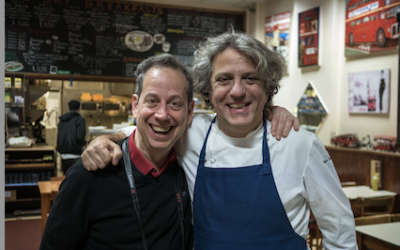 When Camilla Barnard named her organic cereals company rude health she was likely evoking wholesome, happy breakfast bowls as opposed to the cruel gruels forced upon defenseless pupils by pitiless schoolmasters. That’s the message I took from the recyclable cardboard box for her daily oats and its jolly photo of a girl’s legs in pink wellies doing scissors kicks in a field of tall grass. This is no one’s image of British boarding school.
When Camilla Barnard named her organic cereals company rude health she was likely evoking wholesome, happy breakfast bowls as opposed to the cruel gruels forced upon defenseless pupils by pitiless schoolmasters. That’s the message I took from the recyclable cardboard box for her daily oats and its jolly photo of a girl’s legs in pink wellies doing scissors kicks in a field of tall grass. This is no one’s image of British boarding school.
rude health has not ruled out the possibility of lumpy, sticky porridge (oatmeal). Excessive cooking or insufficient stirring will accomplish that. But its blend of rolled oats in two sizes has increased the probability of a wonderfully creamy yet oaty textured result. The finer, fastest-cooking oats give you a risotto-like creaminess, while the larger flakes prevent the porridge from seeming slimy. This isn’t the gritty porridge you get from longer-cooking steel-cut oat groats (fine with me, actually), but these daily oats do bear the distinct aroma of fresh oats, unlike the bland norm for similar products that cook in a few minutes.
 When preparing any brand of rolled oats it is preferable to use a little too much rather than too little water and to cook the porridge at too gentle a simmer rather than anything approaching a full boil. Through trial and error I have also discovered that there is little harm in adding steamed milk, fresh blueberries and either maple syrup, honey or dulce de leche to the finished bowl. Another possibility is oatmeal crème brûlée. The only problem with New York chef David Burke’s recipe: its 2 cups of cream may nullify the oats’ cholesterol-busting benefits.
When preparing any brand of rolled oats it is preferable to use a little too much rather than too little water and to cook the porridge at too gentle a simmer rather than anything approaching a full boil. Through trial and error I have also discovered that there is little harm in adding steamed milk, fresh blueberries and either maple syrup, honey or dulce de leche to the finished bowl. Another possibility is oatmeal crème brûlée. The only problem with New York chef David Burke’s recipe: its 2 cups of cream may nullify the oats’ cholesterol-busting benefits.




0 Comments